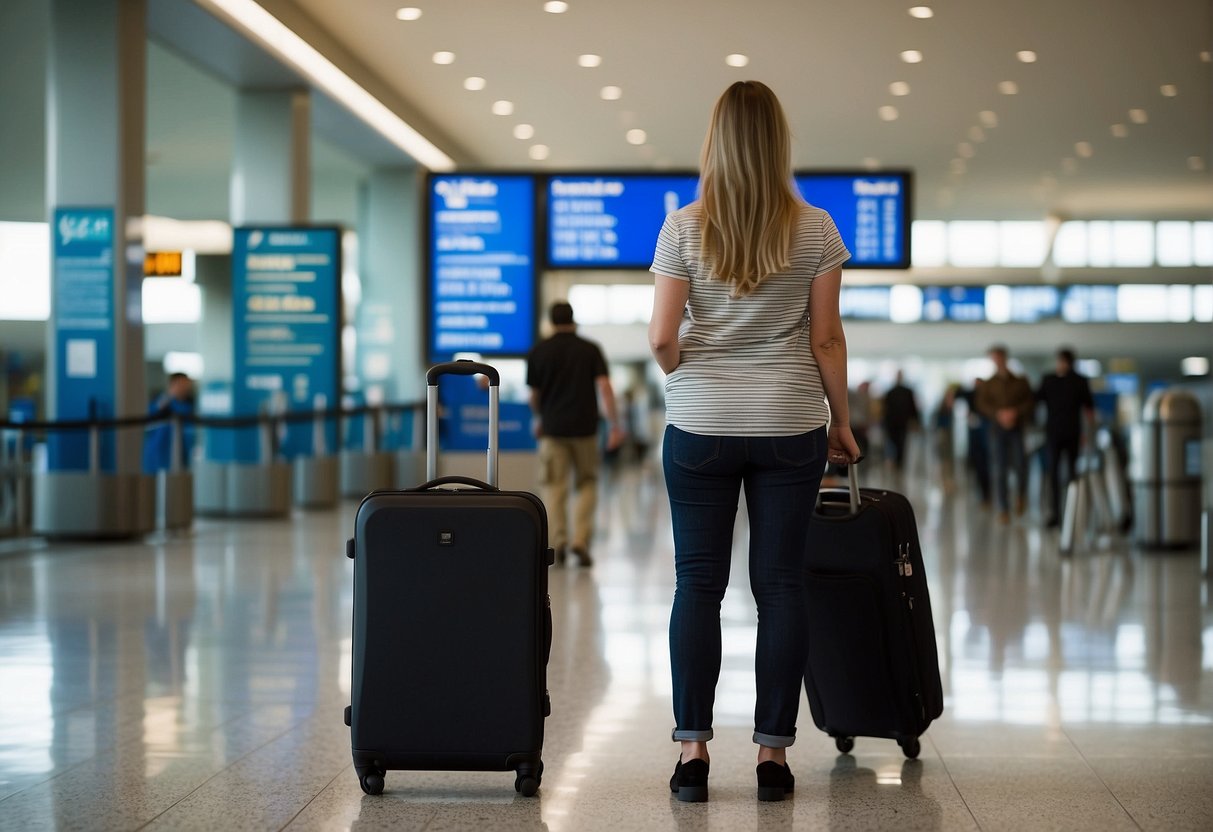Traveling can be an enriching experience, but pregnant women may find it comes with additional considerations and preparations. It is widely accepted that pregnant travelers can generally enjoy international trips if they plan mindfully and heed the advice of their healthcare providers. Women should evaluate the safety and timing of travel, the risk of infectious diseases such as Zika or malaria, the accessibility of healthcare at their destination, and the specifics of their own health during pregnancy.

Choosing the right time for international travel during pregnancy is crucial; the second trimester is often considered the safest and most comfortable period. During this time, the risks of common pregnancy complications are lower, and the discomforts of early pregnancy, such as nausea, typically subside. However, travel restrictions do vary among airlines, especially in the final months of pregnancy, and it’s important to assess the healthcare facilities and support available abroad. Pregnant travelers should also prepare a comprehensive travel checklist that includes important contacts, medical records, and any necessary vaccinations or medications.
Handling emergencies and ensuring timely medical support during travel requires an understanding of one’s insurance coverage and the nearest medical facilities in the destination country. Post-travel follow-up with one’s healthcare provider is also essential to address any health concerns that may have arisen during the trip.
Key Takeaways
- Planning for international travel should include a review of health risks and medical care options abroad.
- The second trimester is commonly the best time for pregnant women to undertake international trips.
- Post-travel healthcare follow-up is crucial to monitor the health of both mother and baby.
Determining Travel Safety During Pregnancy
When planning international travel during pregnancy, it is essential to consider both personal health and external factors affecting the journey.
Assessing Personal Health and Pregnancy Risks
Pregnant travelers should consider their own health and any pregnancy-related risks. It is generally safest to travel in the second trimester, when the risks of miscarriage and premature labor are lower. Women carrying multiples or those with conditions such as severe anemia, diabetes, or high blood pressure may be at higher risk.
Consulting Healthcare Providers
Before travel, a physician or healthcare provider should be consulted. Physicians affiliated with organizations like the American College of Obstetricians and Gynecologists can provide tailored advice based on the individual’s health and the specifics of their pregnancy.
Understanding Destination-Specific Risks
Researching destination-specific health risks is crucial. The CDC provides guidance on areas with prevalent diseases like Zika virus, malaria, and measles. Travelers should also be aware of necessary vaccinations and the safety of applying insect repellent during pregnancy.
Evaluating Airline Policies and Accommodations
Understanding airline policies is vital, particularly during the third trimester. Secure an aisle seat to facilitate movement, which is important for circulation and comfort during flights.
Travel and Pregnancy Insurance Considerations
Securing comprehensive travel insurance that includes coverage for pregnancy-related issues and access to medical facilities is important. Medical evacuation insurance might also be a consideration, ensuring access to suitable medical care in case of emergencies.
Health Precautions and Medical Preparations

When preparing for international travel during pregnancy, it is crucial to prioritize your health and the safety of your unborn child. This includes ensuring your vaccinations are up-to-date, understanding how to manage common pregnancy symptoms while away from home, packing a comprehensive travel health kit, and taking steps to prevent infections and illnesses.
Vaccinations and Pregnancy
Pregnant travelers should consult with their healthcare provider to determine which vaccines are safe, such as the COVID-19 vaccines and influenza shots. It’s essential to avoid live-virus vaccines and get vaccinated against illnesses like hepatitis B, as the risk of transmission can be higher in certain destinations. Always discuss your travel plans and vaccination needs during pregnancy with a medical professional well in advance of your trip.
Managing Common Pregnancy Symptoms
To combat morning sickness while traveling, small, frequent meals and snacks can be helpful. Compression stockings may alleviate discomfort from swelling and reduce the risk of blood clots (DVT), a concern during long flights. Pregnant women should prioritize hydration to prevent dehydration, which can exacerbate symptoms like morning sickness and constipation.
Packing a Travel Health Kit
Your travel health kit should include essential items such as medications approved by your healthcare provider, prenatal vitamins, and remedies for common travel-related ailments that are safe during pregnancy. Avoid products containing bismuth subsalicylate. Ensure you have enough of your prescription drugs for the duration of the trip, and consider including rehydration solutions to quickly address any bouts of dehydration.
Preventing Infections and Illnesses
To prevent mosquito bites that may carry illnesses like the Zika virus, travelers should pack insect repellent and clothes that cover the skin. Be vigilant about food and water consumption to avoid diarrhea, and if you develop a fever or experience severe dehydration, seek medical attention promptly. A well-chosen travel health adapter plug can ensure you can charge any necessary medical devices without a hitch.
Special Considerations for Travel Modes

When traveling internationally during pregnancy, one must consider different modes of transport—each with its unique set of considerations for the health and safety of both the mother and the unborn child.
Flying While Pregnant
Flying can be safe for pregnant travelers, especially during the second trimester. However, aisle seats are preferred by many for easier access to the restroom and to facilitate regular movement. Compression stockings may help reduce the risk of deep vein thrombosis (DVT) and it’s important to often perform ankle circles and stretches to maintain good circulation, especially on long international flights. Pregnant women should stay hydrated to avoid dehydration due to the high altitudes and low humidity in the cabin.
Cruising During Pregnancy
Before setting sail, one should ensure that the cruise line has appropriate medical facilities onboard. Not all cruises are equipped to handle pregnancy complications, hence verifying these details beforehand is critical. Always check the cruise line’s policies regarding pregnancy, as some have restrictions on traveling after a certain gestational age. It is also wise to consider medical evacuation insurance when traveling by sea due to the potential for needing transportation to a land-based hospital.
Ground Transportation Strategies
For those considering ground transportation, such as buses or trains, choosing an aisle seat for easy movement remains a key strategy. Carrying water to maintain hydration and planning frequent breaks can help prevent dehydration and stiffness. When traveling by car, wearing a seatbelt below the belly and across the hips is crucial for protection. Pregnant travelers should familiarize themselves with the nearest medical facilities along their route, whether they opt for a luxurious train journey or a more practical bus ride.
Remember, no matter the transport mode, keeping mobility, comfort, and access to medical care in mind is paramount when planning a trip during pregnancy.
Handling Emergencies and Unplanned Issues

When traveling internationally during pregnancy, it’s imperative for expectant mothers to have a clear plan for accessing emergency care and managing potential complications. Understanding where and how to obtain medical support can significantly mitigate risks.
Accessing Emergency Care Abroad
In the event of an emergency, knowing how to quickly access quality health care is crucial. Travelers should:
- Identify local healthcare facilities in advance, focusing on those with obstetrics specialists.
- Carry a list of local emergency numbers and addresses for hospitals or clinics.
- Purchase medical evacuation insurance to ensure transport to a facility with appropriate care if needed.
Expectant mothers categorized as high risk should communicate with a healthcare provider about a travel health plan that considers proximity to capable medical facilities.
Dealing with Pregnancy Complications
Understanding how to respond to complications of pregnancy such as spontaneous abortion or premature labor is essential:
- Be vigilant for signs like pelvic or abdominal pain, bleeding, or regular contractions, which necessitate immediate medical attention.
- Immediate contact with healthcare services is vital for symptoms indicative of preeclampsia or dehydration.
Ultimately, preparedness is key. Securing comprehensive travel health insurance that covers delivery and complications of pregnancy can provide peace of mind and needed support.
Post-Travel Follow-Up

After returning from international travel, pregnant individuals should schedule a follow-up appointment with their healthcare provider. This visit is a critical step to ensure both the mother’s and baby’s health remain on track. At this check-up, the healthcare provider will typically:
- Evaluate the mother for any signs of infectious diseases common to the regions visited.
- Assess the overall health of the mother, including blood pressure and weight, to check for any changes that may have occurred during travel.
- Review the mother’s vaccination record in case any travel-related vaccines were administered.
Symptom Monitoring:
- Monitor for any pregnancy-related symptoms that may have emerged or worsened while traveling, like swelling or severe headaches.
- Inquire about any unusual symptoms such as persistent nausea, abdominal pain, or contractions that may signify a need for additional medical attention.
It is important for pregnant travelers to report any medical care they received abroad, including treatments, medications, or interactions with healthcare providers. They should provide their physician with as much detail as possible about the care received.
| Post-Travel Considerations | Action Required |
|---|---|
| Medical care received while abroad? | Disclose details to healthcare provider. |
| Changes in health since travel? | Discuss any new or worsening symptoms. |
| Vaccinations or medications? | Update healthcare provider on new treatments. |
The follow-up appointment should be viewed as an integral part of the travel process for pregnant women to ensure a continuation of care and to address any potential health concerns promptly and effectively.
Frequently Asked Questions
When planning international travel during pregnancy, individuals should consider the timing of their trip, airline policies, health precautions, and destination safety.
How many weeks into pregnancy is it safe to engage in international flights?
It is generally considered safe for individuals without pregnancy complications to fly internationally before 36 weeks of gestation. However, it’s important to consult with a healthcare provider prior to travel.
Are there specific travel restrictions for pregnant individuals flying internationally?
Yes, airlines often have specific guidelines for pregnant passengers, such as requiring a medical certificate beyond a certain point in the pregnancy. These restrictions can vary between airlines.
What are some medical considerations one should take into account before traveling internationally while pregnant?
Travelers should be aware of the signs of labor or complications and understand when to seek urgent medical attention. It’s crucial to discuss any pre-existing conditions and immunization needs with a healthcare provider.
Which destinations are considered safer for pregnant travelers?
Destinations with adequate healthcare facilities, low risk of infectious diseases, and minimal need for adventurous activities are considered safer for pregnant travelers.
What guidelines do airlines typically follow for pregnant passengers during air travel?
Airlines typically require pregnant passengers to provide a doctor’s note, and they may limit travel after a certain week of pregnancy to minimize the risk of in-flight complications.
Is it safe to engage in long-distance road travel during the third trimester of pregnancy?
While road travel can be undertaken during the third trimester, it’s important for pregnant travelers to take frequent breaks to walk and stretch, stay hydrated, and have access to medical care if needed.
Leave a Reply